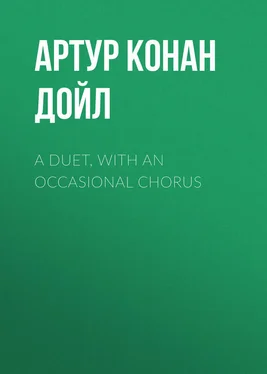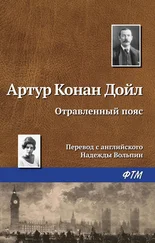Артур Дойл - A Duet, with an Occasional Chorus
Здесь есть возможность читать онлайн «Артур Дойл - A Duet, with an Occasional Chorus» — ознакомительный отрывок электронной книги совершенно бесплатно, а после прочтения отрывка купить полную версию. В некоторых случаях можно слушать аудио, скачать через торрент в формате fb2 и присутствует краткое содержание. Жанр: foreign_antique, foreign_prose, на английском языке. Описание произведения, (предисловие) а так же отзывы посетителей доступны на портале библиотеки ЛибКат.
- Название:A Duet, with an Occasional Chorus
- Автор:
- Жанр:
- Год:неизвестен
- ISBN:нет данных
- Рейтинг книги:4 / 5. Голосов: 1
-
Избранное:Добавить в избранное
- Отзывы:
-
Ваша оценка:
- 80
- 1
- 2
- 3
- 4
- 5
A Duet, with an Occasional Chorus: краткое содержание, описание и аннотация
Предлагаем к чтению аннотацию, описание, краткое содержание или предисловие (зависит от того, что написал сам автор книги «A Duet, with an Occasional Chorus»). Если вы не нашли необходимую информацию о книге — напишите в комментариях, мы постараемся отыскать её.
A Duet, with an Occasional Chorus — читать онлайн ознакомительный отрывок
Ниже представлен текст книги, разбитый по страницам. Система сохранения места последней прочитанной страницы, позволяет с удобством читать онлайн бесплатно книгу «A Duet, with an Occasional Chorus», без необходимости каждый раз заново искать на чём Вы остановились. Поставьте закладку, и сможете в любой момент перейти на страницу, на которой закончили чтение.
Интервал:
Закладка:
As a matter of fact, I must have my dress to be married in. I don’t think mother would regard it as a legal marriage if I hadn’t, and if you knew how nice it will be, you would not have the heart to interfere with it. Try to picture it, silver-grey – I know how fond you are of greys – a little white chiffon at neck and wrists, and the prettiest pearl trimming. Then the hat en suite , pale-grey lisse, white feather and brilliant buckle. All these details are wasted upon you, sir, but you will like it when you see it. It fulfils your ideal of tasteful simplicity, which men always imagine to be an economical method of dressing, until they have wives and milliners’ bills of their own.
And now I have kept the biggest news to the last. Mother has been to Madame, and she says that if she works all night, she will have everything ready for the 30th. O Frank, does it not seem incredible! Next Tuesday three weeks. And the banns! Oh my goodness, I am frightened when I think about it! Dear old boy, you won’t tire of me, will you? Whatever should I do if I thought you had tired of me! And the worst of it is, that you don’t know me a bit. I have a hundred thousand faults, and you are blinded by your love and cannot see them. But then some day the scales will fall from your eyes, and you will perceive the whole hundred thousand at once. Oh, what a reaction there will be! You will see me as I am, frivolous, wilful, idle, petulant, and altogether horrid. But I do love you, Frank, with all my heart, and soul, and mind, and strength, and you’ll count that on the other side, won’t you? Now I am so glad I have said all this, because it is best that you should know what you should expect. It will be nice for you to look back and to say, ‘She gave me fair warning, and she is no worse than she said.’ O Frank, think of the 30th.
P.S. – I forgot to say that I had a grey silk cape, lined with cream, to go with the dress. It is just sweet!
So that is how they arranged about the date.
THE OVERTURE CONTINUED
My own dearest Maude, – How I wish you were here, for I have been down, down, down, in the deepest state of despondency all day. I have longed to hear the sound of your voice, or to feel the touch of your hand! How can I be despondent, when in three weeks I shall be the husband of the dearest girl in England? That is what I ask myself, and then the answer comes that it is just exactly on that account that my wretched conscience is gnawing at me. I feel that I have not used you well; I owe you reparation, and I don’t know what to do.
In your last dear letter you talk about being frivolous. You have never been frivolous. But I have been frivolous – for ever since I have learned to love you, I have been so wrapped up in my love, with my happiness gilding everything about me, that I have never really faced the prosaic facts of life or discussed with you what our marriage will really necessitate. And now, at this eleventh hour, I realise that I have led you on in ignorance to an act which will perhaps take a great deal of the sunshine out of your life. What have I to offer you in exchange for the sacrifice which you will make for me? Myself, my love, and all that I have – but how little it all amounts to! You are a girl in a thousand, in ten thousand – bright, beautiful, sweet, the dearest lady in all the land. And I an average man – or perhaps hardly that – with little to boast of in the past, and vague ambitions for the future. It is a poor bargain for you, a most miserable bargain. You have still time. Count the cost, and if it be too great, then draw back even now without fear of one word or inmost thought of reproach from me. Your whole life is at stake. How can I hold you to a decision which was taken before you realised what it meant? Now I shall place the facts before you, and then, come what may, my conscience will be at rest, and I shall be sure that you are acting with your eyes open.
You have to compare your life as it is, and as it will be. Your father is rich, or at least comfortably off, and you have been accustomed all your life to have whatever you desired. From what I know of your mother’s kindness, I should imagine that no wish of yours has ever remained ungratified. You have lived well, dressed well, a sweet home, a lovely garden, your collie, your canary, your maid. Above all, you have never had anxiety, never had to worry about the morrow. I can see all your past life so well. In the mornings, your music, your singing, your gardening, your reading. In the afternoons, your social duties, the visit and the visitor. In the evening, tennis, a walk, music again, your father’s return from the City, the happy family-circle, with occasionally the dinner, the dance, and the theatre. And so smoothly on, month after month, and year after year, your own sweet, kindly, joyous nature, and your bright face, making every one round you happy, and so reacting upon your own happiness. Why should you bother about money? That was your father’s business. Why should you trouble about housekeeping? That was your mother’s duty. You lived like the birds and the flowers, and had no need to take heed for the future. Everything which life could offer was yours.
And now you must turn to what is in store for you, if you are still content to face the future with me. Position I have none to offer. What is the exact position of the wife of the assistant-accountant of the Co-operative Insurance Office? It is indefinable. What are my prospects? I may become head-accountant. If Dinton died – and I hope he won’t, for he is an excellent fellow – I should probably get his berth. Beyond that I have no career. I have some aspirations after literature – a few critical articles in the monthlies – but I don’t suppose they will ever lead to anything of consequence.
And my income, £400 a year with a commission on business I introduce. But that amounts to hardly anything. You have £50. Our total, then, is certainly under £500. Have you considered what it will mean to leave that charming house at St. Albans – the breakfast-room, the billiard-room, the lawn – and to live in the little £50 a year house at Woking, with its two sitting-rooms and pokey garden? Have I a right to ask you to do such a thing? And then the housekeeping, the planning, the arranging, the curtailing, the keeping up appearances upon a limited income. I have made myself miserable, because I feel that you are marrying me without a suspicion of the long weary uphill struggle which lies before you. O Maude, my darling Maude, I feel that you sacrifice too much for me! If I were a man I should say to you, ‘Forget me – forget it all! Let our relations be a closed chapter in your life. You can do better. I and my cares come like a great cloud-bank to keep the sunshine from your young life. You who are so tender and dainty! How can I bear to see you exposed to the drudgery and sordid everlasting cares of such a household! I think of your graces, your pretty little ways, the elegancies of your life, and how charmingly you carry them off. You are born and bred for just such an atmosphere as the one which you breathe. And I take advantage of my good-fortune in winning your love to drag you down, to take the beauty and charm from your life, to fill it with small and vulgar cares, never-ending and soul-killing. Selfish beast that I am, why should I allow you to come down into the stress and worry of life, when I found you so high above it? And what can I offer you in exchange?’ These are the thoughts which come back and back all day, and leave me in the blackest fit of despondency. I confessed to you that I had dark humours, but never one so hopeless as this. I do not wish my worst enemy to be as unhappy as I have been to-day.
Читать дальшеИнтервал:
Закладка:
Похожие книги на «A Duet, with an Occasional Chorus»
Представляем Вашему вниманию похожие книги на «A Duet, with an Occasional Chorus» списком для выбора. Мы отобрали схожую по названию и смыслу литературу в надежде предоставить читателям больше вариантов отыскать новые, интересные, ещё непрочитанные произведения.
Обсуждение, отзывы о книге «A Duet, with an Occasional Chorus» и просто собственные мнения читателей. Оставьте ваши комментарии, напишите, что Вы думаете о произведении, его смысле или главных героях. Укажите что конкретно понравилось, а что нет, и почему Вы так считаете.










